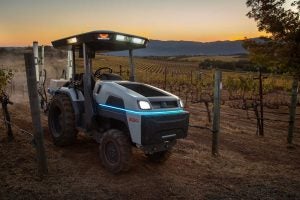AGDAILY and its parent company were paid a fee to publish this article unedited. The views or opinions expressed here are those of the author and may not reflect those of AGDAILY or any of its affiliates.
It is not recent news that electric vehicles are popping up on city streets, but did you know that they have even found their application on the farm, too? Yep, you heard it right! No more room for the sophisticated roaring engines and the old-school tractors kicking up dust. It’s time for a green revolution in agriculture.
Outgassing, which causes the greenhouse effects and noise pollution from heavy machinery, will be gone. The introduction of electric vehicles on farms brings farmers cleaner, quieter, and more efficient operations.
And guess what? You can find electric replica cars for sale on Dyler, an online marketplace that shows an abundance of EVs on sale dedicated to working farm needs.
Brief Overview of the Increasing Adoption of EVs in Farming
Perhaps one of the most notable impacts that EVs have had is the reduction of CO2 emissions throughout many sectors, including agriculture. Unlike the rise in CO2 emissions by 37% in 2022 caused by conventional vehicles, electric vehicles provide eco-friendly and sustainable options for farmers.
Among others, there are a number of reasons behind this growing adoption of EVs in farming. Primarily, the environmental concerns and the necessity of mitigating the climate crisis have made farmers search for more environmentally friendly methods.
Furthermore, technological advancements have led to the development of electric tractors, utility vehicles, and other farm equipment with improved efficiency and performance. In addition to this, Ev’s low operating costs and maintenance expenses are the main reasons why farmers may support this idea.
Sustainability of Electric Farm Vehicles
The electrification of farm vehicles is a promising way to make agricultural practices as sustainable as possible. These vehicles help the environment by virtually eliminating greenhouse gas emissions and reducing fossil fuel exploitation to a minimum.
Powering electric farm vehicles with renewables, such as solar or wind energy for charging, fortifies their sustainable profile. Also, the long life of electric farm vehicles makes them sustainable.
Because of that electric vehicles have lower numbers of moving parts and also simplified maintenance requirements compared to conventional diesel-powered machinery resulting in their longer lifespans and lower operating costs over time. It not only decreases environmental pollution but also increases the economic profit for the farmers.
Besides, these electric farm vehicles support healthy soil through the lack of release of damaging pollutants connected to internal combustion engines. Therefore, it strengthens ecosystem health and biodiversity on farms.
The sustainability of electric farm vehicles goes beyond the environmental benefits to include economic resilience and biodiversity preservation, making them crucial tools for the agriculture of tomorrow.
Types of Electric Vehicles Used in Agriculture
Here are some of the types of electric vehicles used for farming:
Electric Tractors and Utility Vehicles
Electric tractors and utility vehicles are universal equipment used for various activities such as plowing, planting, and hauling in agriculture. By switching to these electric vehicles, farmers will receive both the power and performance needed for their work while eliminating emissions and cutting costs.

Electric ATVs and Side-by-Sides
Electrical ATVs and side-by-sides give farmers opportunities to be mobile in various terrains. These compact and agile vehicles are designed for initiatives such as fence inspection, crop scouting, and animal husbandry without much noise and with little effect on the environment.
Electric Drones and Autonomous Equipment
Drones with electric engines and auto-pilot equipment are creating precision agriculture by delivering up-to-date data and automation capability.
These devices allow monitoring of crop health, assessing the ground conditions as well as applying the inputs with a precision that, in the long run, increases productivity and optimizes resource use in farming operations.
Applications of Electric Vehicles in Farming Operations
EVs can be used in various farming operations, enhancing efficiency and sustainability across the agricultural sector. These include:
Field Work and Crop Management
Electric tractors, as well as utility vehicles, are great for plowing, planting, and harvesting crops. Their silent modes and emission-less characteristics make them perfect for farming, which results in the reduction of environmental pollution.
Livestock Management and Feeding
Electric ATVs and side-by-sides can carry out jobs ranging from checking on livestock and distributing feed to managing pastures. The efficiency of their mobility and noiselessness makes them perfect for running livestock operations.
Transportation and Logistics
Electric vehicles can be used to transport field crops, equipment, and personnel around the farm. Thanks to the ability to travel across diverse terrains, electric vehicles provide flexibility for farm logistics systems and reduce dependency on fossil fuels.
Challenges and Considerations
The adoption of electric vehicles in farming is not without challenges and dilemmas. The range constraints and the battery technology inevitably influence the applicability of EVs in collective farming operations.
Furthermore, regulatory and safety aspects, including licensing of electric vehicles and proper training of the operators, must be resolved. In spite of these challenges, farmers can overcome them by using innovation and collaboration in order to achieve the entire pledge of electric vehicles in today’s agriculture.
Conclusion
Modern-day farming involves the use of EVs to support environment-friendly agricultural techniques. While the obstacles, like the initial costs and the infrastructural difficulties, might seem problematic, the advantages of EVs, such as reduced emissions and increased efficiency, cannot be denied.
With technologies continuously advancing and general knowledge increasing, electric vehicles will be central to the future of agriculture and contribute to sustainability and productivity improvement on farms across the globe.

